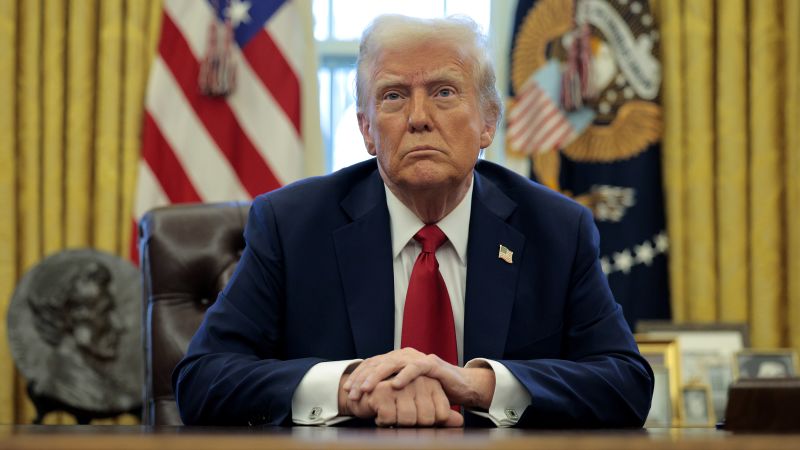“`html

Fact Check Analysis: US Tariffs on Mexico, Canada, and China
Our editorial team received a fact-check request from one of our subscribers regarding a CNN article titled “Trump announces significant new tariffs on Mexico, Canada and China, sparking retaliatory actions.” The user specifically wanted to clarify whether US consumers will be the hardest hit and if these tariffs will have any positive impact on the US economy. As experts in the field of investigating misinformation, we took a deep dive into multiple claims, sources, and stakeholders involved to provide an accurate and unbiased analysis of the article.
Article Context and Concerns
The CNN article in question, which can be accessed here, covers the sweeping tariffs announced by President Donald Trump that target imports from Mexico, Canada, and China. The article suggests that American consumers could face significant price increases due to the tariffs and argues that the financial benefits for the US may be limited. Multiple stakeholders, including government officials, economists, and industry groups, were quoted in opposition to the tariffs.

Fact Check Findings
Claim 1: “US Consumers will be the hardest hit financially by the tariffs.”
Analysis: This claim is supported by economic research, including findings from the Peterson Institute for International Economics cited in the article. The reality of how tariffs function underlines the accuracy of this assertion. Tariffs are essentially taxes imposed on imports, and the burden ultimately falls on the importers—in this case, American companies—who pass these costs onto consumers through higher prices. The statement aligns with past analyses of tariffs, including those from Trump’s first term, which confirmed higher prices on consumer goods. However, the article could provide greater nuance by addressing that the degree of impact may vary across product categories and regions.

Claim 2: “The tariffs aim to curb drug trafficking and undocumented immigration.”
Analysis: While the Trump administration has framed the tariffs as a measure to address these issues, there is little evidence to suggest tariffs are an effective tool for stopping drug trafficking or undocumented immigration. These challenges are deeply rooted in systemic issues that tariffs on imports are unlikely to resolve. Furthermore, the CNN article correctly points out the lack of specific benchmarks for lifting the tariffs, which raises questions about the administration’s focus on measurable outcomes. The accusation against the Mexican government regarding alleged alliances with cartels is unsubstantiated and inflammatory, and CNN was correct to highlight Mexican President Claudia Sheinbaum’s denial.
Claim 3: “These tariffs will do little to financially benefit the US economy.”
Analysis: This claim, while valid in part, overlooks critical nuances. Tariffs often aim to reduce dependency on foreign imports, thereby encouraging domestic production, which can theoretically bolster certain industries. However, the article fails to fully consider potential long-term shifts in production strategies or increased revenue from import duties as stated by the administration. The broader economic consensus does suggest that tariffs disrupt trade flows, harm consumer purchasing power, and lead to retaliation, often nullifying short-term gains. Contextually, the article provides a one-sided perspective without delving into economic scenarios where tariffs may stimulate local industries.

Additional Insights for Readers’ Questions
Readers have raised important questions about whether these tariffs will help or hurt the US economy overall. Economists largely agree that tariffs disrupt global supply chains and make economies less efficient. The tariff policy will benefit specific sectors, such as segments of US steel manufacturing, but these gains are offset by higher costs for consumers and retaliatory measures that may affect export-oriented industries. As such, while a limited group of American producers might see advantages, the overarching outcome is likely to be negative for the broader economic landscape.
Furthermore, the claim that tariffs will make the US “very rich” as President Trump suggested in the article does not align with historical precedent. Previous tariff implementations have shown that jobs in protected industries often come at a high cost, reflecting inefficiencies rather than wealth generation. The article downplays this complexity in favor of emphasizing the adverse outcomes.
Conclusion
CNN’s article is largely accurate in its claims about the financial impact of the tariffs on consumers and their limited utility in achieving stated goals such as stopping immigration or drug trafficking. However, it misses an opportunity to explore the nuanced arguments for and against the tariffs, leaving readers with an imbalanced view. The economic repercussions will indeed hit U.S. consumers hard, but certain domestic sectors could benefit in the short term under the right conditions. Readers seeking a deeper understanding should remain skeptical of oversimplified explanations and look for additional data points, many of which are omitted from the article.
For those interested in fighting misinformation and getting thorough, unbiased insights like this, our new DBUNK app launches soon! Stay tuned, and don’t forget to follow us on social media for updates.
“`

